College of Human Sciences
Recognition for Unisan’s journey of decolonising African epistemology
Prof Elijah Baloyi, a distinguished scholar from the Research Institute of Theology and Religion in the College of Human Sciences, has been honoured with a prestigious award for his groundbreaking article titled "General Linguistics 2023: Ku susa vukoloni eka nhlamuselo ya rito 'nsati' na 'nuna' eka Xitsonga-dyondzo ya nsusavukoloni".
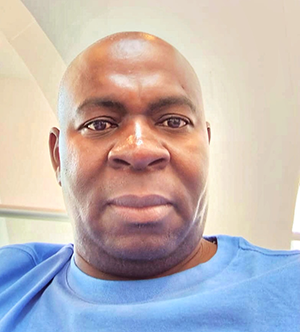
Prof Elijah Baloyi
This accolade was bestowed upon him at the 25th International Conference of the African Languages Association of Southern Africa (ALASA), held at the Coastlands Hotel and Resort from 9 to 12 July 2024. His recognition is not only a testament to his academic rigor, but also a significant milestone in the ongoing efforts to decolonise African languages and epistemologies.
In an interview, Baloyi shared key lessons from his academic journey. He emphasised the importance of doing things differently, arguing that the persistence of colonial dependency has hindered the creation of truly African knowledge. For too long, African scholars have been reproducing and recreating Western knowledge, and Baloyi believes it is time to place Africa and its epistemologies at the centre of academic discourse.
He also highlighted the significance of knowledge creation in vernacular languages, stating that "new knowledge about us must be created and taught, especially in vernacular languages". Baloyi advocates for the empowerment of ordinary people, particularly those from rural areas, to engage in knowledge creation, as greater insights often emerge from these perspectives.
Balancing personal life with academic pursuits can be challenging, particularly when family and studies are geographically separated. Baloyi, who pursued studies in the United States while his family remained in Africa, reflected on the importance of prioritising and time management. He drew on African idioms to underscore the value of learning, even in the face of adversity, as a lifelong investment that benefits not only the individual but also the broader community.
Research interests: Gender, culture and indigenous knowledge systems
Baloyi's research interests are deeply rooted in gender inequality, culture and tradition. He observed that gender cannot be studied in isolation and that indigenous knowledge systems are essential for the decolonisation and Africanisation of academic disciplines. The disruption of African burial rites during the Covid-19 pandemic served as a stark reminder of the ways in which colonialism has dislocated African practices. Baloyi's research team, comprising members from South Africa, Kenya, Zambia, and Nigeria, collaborates with the Congress of Traditional Leaders of South Africa (CONTRALESA) to ground their findings in indigenous knowledge.
At present, Baloyi is involved in a research collaboration with the Center of Theological Inquiry in Princeton, where he explores the intersections of theology, psychology and philosophy. He is the first person from Unisa to participate in these global scholarly collaborations, which he views to advance African epistemologies on an international stage.
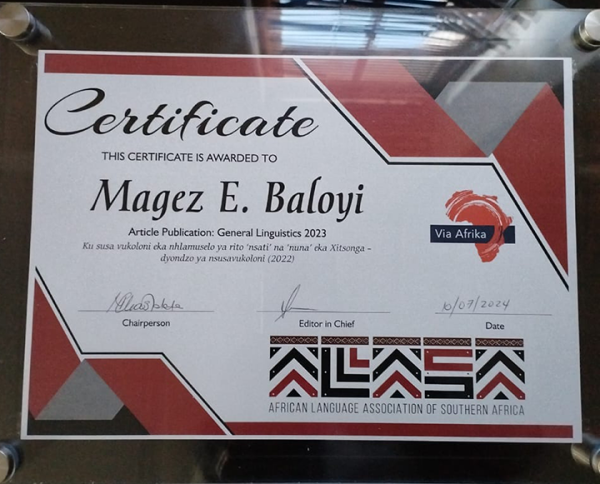
The certificate awarded to Prof Baloyi
Teaching: The role of education in self-knowledge and critical thinking
Baloyi's teaching philosophy is driven by a desire to foster critical and creative thinking. He believes that education should help students understand and appreciate who they are, while also equipping them to become who they aspire to be. He is critical of the tendency within higher education to reproduce existing knowledge rather than create new insights. Baloyi contends that teaching must challenge the status quo and encourage students to think critically about what they are learning.
Community engagement: Bridging the gap between academia and society
Baloyi's commitment to community engagement is evident in his research, which he views as bridging the gap between academia and society. He argues that research initiated at the grassroots level is more likely to address the real needs of the community. For him, the voices of traditional leadership and the stories of ordinary Africans are invaluable sources of knowledge, often overlooked by library and desktop research.
The award: A recognition of African languages and epistemologies
Receiving the award for his article written in Xitsonga, a language often marginalised within South Africa's official languages, is a momentous achievement for Baloyi. He views this recognition not as a personal triumph, but as a victory for all those who aspire to bring African epistemologies back to the centre of academic discourse. He expressed his excitement to be part of this transformative journey, which seeks to uplift previously disadvantaged groups and restore their rightful place in the world of knowledge.
Future aspirations: Expanding African research and collaboration
Looking ahead, Baloyi aspires to extend his research to other countries and continue his work on the erosion of African traditional burial rites. He is currently in Princeton in the United States on a two-year scholarship, collaborating with scholars from around the globe. His goal is to showcase African identity and knowledge on an international platform, ensuring that Africa's potential is recognised and valued. Baloyi's career is focused on addressing the legacies of colonialism and advocating for the Africanisation of knowledge. He envisions a future where theology engages with other disciplines and where African research addresses the continent's unique challenges. His legacy, he hopes, will be one of empowering ordinary Africans to know, love, and appreciate themselves, as they continue their journey toward self-actualisation.
As the Jamaican political activist Marcus Garvey once said, "People without knowledge of their history are like a tree without roots." Baloyi's work is rooted in this belief, as he seeks to cultivate a deeper understanding of African history, culture, and identity through his research, teaching, and community engagement.
* By IHubi Veli Mabona, Marketing Assistant, CHS Communications and Marketing Office
Publish date: 2024-09-17 00:00:00.0


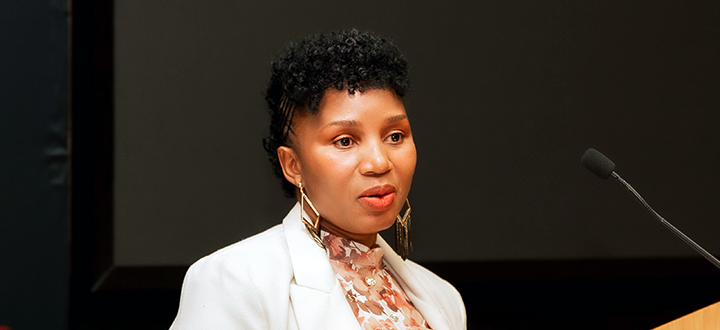 Wings of opportunity: Bringing drones into the classroom
Wings of opportunity: Bringing drones into the classroom
 Visionary youth champion to address Unisa’s Innovation Festival
Visionary youth champion to address Unisa’s Innovation Festival
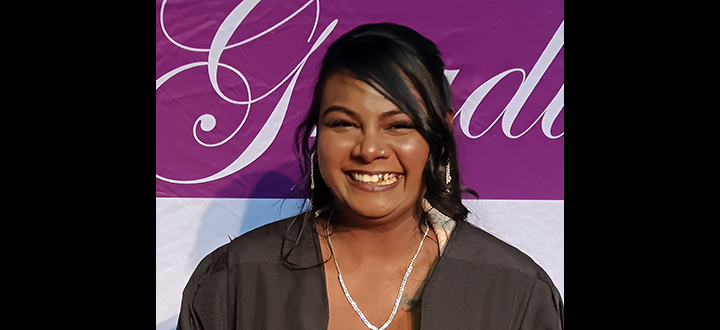 Finding the strength to persevere
Finding the strength to persevere
 Disability awareness at Unisa: Disability is not inability
Disability awareness at Unisa: Disability is not inability
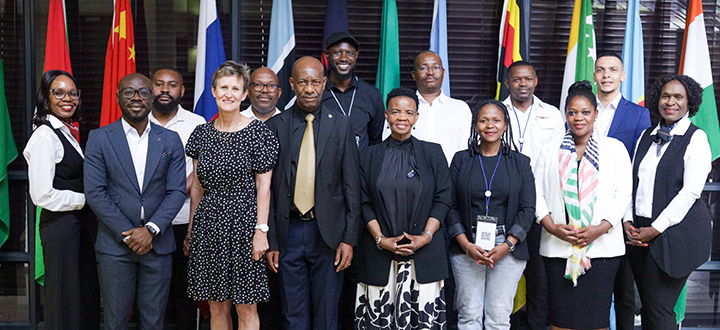 Unisa symposium shares knowledge on building SA's aviation economy
Unisa symposium shares knowledge on building SA's aviation economy